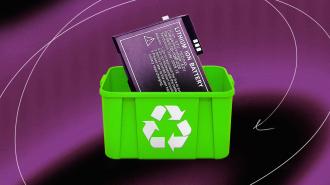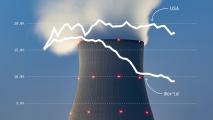A new partnership aims to decrease the environmental impact of manufacturing lithium-ion batteries in North America by injecting recycled metal into the supply chain.
The challenge: Demand for lithium-ion batteries is expected to increase seven-fold between 2022 and 2030, according to experts at McKinsey, and that increase is driven largely by electric vehicles (EVs).
In one respect, that’s great news — transitioning the transportation sector away from fossil fuels will slash our greenhouse gas emissions.
However, the metals for lithium-ion batteries are typically mined in an energy-intensive way that generates emissions and harms local ecosystems. Additionally, just 5% of used lithium-ion batteries are recycled — the vast majority go to landfills, where they can leak toxins into the environment.
Demand for lithium-ion batteries is expected to increase seven-fold between 2022 and 2030.
What’s new? To decrease the demand for newly mined metals, lithium-ion battery maker Nanotech Energy is now partnering with three other companies to create what the group says is North America’s first “closed-loop” system in manufacturing lithium-ion batteries.
The plan is for Nanotech to send its battery scrap and other materials that aren’t high enough quality for use to American Battery Technology Company (ABTC), which will use advanced recycling processes to extract raw metals from the materials.
The recovered metals will then be sent to two companies: TODA Advanced Materials (TODA) and BASF. TODA will use them to create battery precursor materials, while BASF will turn them into cathode active materials. Nanotech will then use those to create new lithium-ion batteries.
“By working together, our four companies can pool their expertise and drive better and more sustainable outcomes for the entire North American electric vehicle and consumer electronics industries,” said Curtis Collar, Nanotech Energy’s chief marketing and sales officer.
The big picture: This approach won’t end Nanotech’s need for newly mined metals, but it will reduce it, which is a step in the right direction.
Ultimately, though, we need to increase the recycling of lithium-ion batteries themselves using more efficient methods. Exploring cleaner sources of lithium is also important, as is the continued development of batteries that don’t require lithium and other hard-to-come-by materials in the first place.
We’d love to hear from you! If you have a comment about this article or if you have a tip for a future Freethink story, please email us at [email protected].






